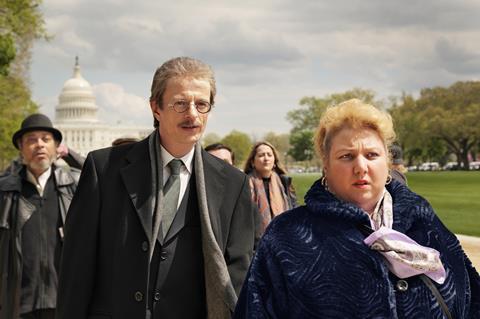Well-intentioned German drama plays up the humour in this true-life fight for justice story

Dir. Andreas Dresen. Germany/France. 2022. 119 mins.
If you’re a sucker for those films in which indomitable mothers fight for family and justice, you won’t find a purer version of the form than Andreas Dresen’s Berlinale competition entry Rabiye Kurnaz Vs George W. Bush. The true story of a Turkish-German woman struggling to get her son freed from Guantanamo, the drama is impeccably well-intentioned, and leavened with a juicily characterful – if sometimes shamelessly ingratiating – lead role from TV comedian and presenter Meltem Kaptan. But it’s a sluggish, dramatically and visually inert piece that not long ago – before the dividing lines between cinema and TV were irreversibly blurred – would have been considered very much a TV-style offering. It’s hard to imagine it thriving after its premiere, although Turkish audiences in Germany and elsewhere may well warm to it, as might fests and outlets with a human rights focus.
The film is very much in the true-life fight-for-justice vein
Scripted by Laila Stieler and directed by a film-maker best known internationally for his dramas Stopped On Track and Cloud 9, Rabiye Kurnaz tells the story of a middle-aged Turkish woman living in Bremen, whose life is rocked in October 2001 when she discovers that her 19-year-old son Murat (Abdullah Emre Öztürk) has suddenly left the family and flown to Pakistan. She goes to the local police for help, only to discover a few months later that Murat has been arrested on suspicion of terrorism, and is now a prisoner of the US in Guantanamo. Rabiye decides to appoint a lawyer and, choosing one pretty much at random, persuades Bernhard Docke (Alexander Scheer) to take up her case. He proves a committed ally, and over the next four years, a bullish defender of the Kurnaz family’s cause, accompanying Rabiye more than once to Washington to take the fight to the US authorities.
Deriving a docudrama edge from captions that identify the dates and count the days –2001 to 2006, days 1 to 1786 – Dresen’s fairly grim, unmistakably serious tale nevertheless has a lacing of boisterous humour, especially at the start. The comedy is supplied by Kaptan’s ebullient performance as a naïve, often ill-informed but altogether irrepressible force of nature, who thinks nothing of buttonholing powerful politicians, bursting into Docke’s office on a whim, or driving like a maniac when in high spirits. The script plays somewhat knowingly with Rabiye’s gaucheness, the product of leading a sheltered life in a very traditional homemaker capacity: first hearing about Guantanamo, she innocently asks (as the English subtitles put it), “How do I get to Camp…Cuba… thingy?” Kaptan also larkily plays up the humour in Rabiye at once determinedly fighting the good fight and discovering the high life: ironically, it’s thanks to her struggle that she gets to drink champagne while flying business class.
The film is very much in the true-life fight-for-justice vein recently represented by another Guantanamo drama, Kevin Macdonald’s The Mauritanian, or indeed, in a brisker mode, Stephen Frears’s Philomena. But beyond Kaptan’s lead, there’s little fizz, and a rather prosaic tone that the film never quite shakes off. In courtroom and other crucial scenes, the dialogue sometimes fades out to be replaced by gentle acoustic guitar, which seems something of a cop-out dramatically – even if you wouldn’t necessarily want every such sequence to have the barnstorming intensity of an Aaron Sorkin drama. Things can also be leadenly predictable, as in one of the American scenes, where Rabiye reluctantly stands up in front of an audience, shyly mutters a few words – then opens up in a passionate profession of faith that wins her a standing ovation.
The overall flatness may be a result of Stieler and Dresen choosing to represent the case without spuriously stacking the narrative with dramatic and decisive reversals. Even so, one gets the sense of events simply being recounted dutifully in order, and – beyond Rabiye herself – the film doesn’t have enough well-observed characterisation to offset the gap. Scheer is likeable, if a little stiff – appropriately perhaps – as the reserved, honourable Docke, warming up in the odd moment of discreet rapprochement with Rabiye (the film is something of a platonic odd-couple love story, although scrupulously underplayed). Other characters, notably Rabiye’s husband Mehmet (Nazmi Kirik) and their two young sons, are sketchy, although Sevda Polat contributes some irreverent spark as Rabiye’s more worldly younger sister. In a cameo likely to mean most to domestic audiences, a famous Hollywood star named ‘Tim Williams’ is played by Tim Williams, a US actor active in Germany, and notorious as the face of the Trivago.com hotel booking company.
Production company: Pandora Film Produktion
International sales: The Match Factory, info@matchfactory.de
Producers: Claudia Steffen, Christoph Friedel
Screenplay: Laila Stieler
Cinematography: Andreas Höfer
Editor: Jörg Hauschild
Production design: Susanne Hopf
Music: Johannes Repka, Cenk Erdogan
Main cast: Meltem Kaptan, Alexander Scheer, Charly Hübner, Nazmi Kirik, Sevda Polat, Abdullah Emre Ozturk















![[L-R]: Amanda Villavieja, Laia Casanovas, Yasmina Praderas](https://d1nslcd7m2225b.cloudfront.net/Pictures/274x183/6/4/1/1471641_pxl_20251224_103354743_618426_crop.jpg)








